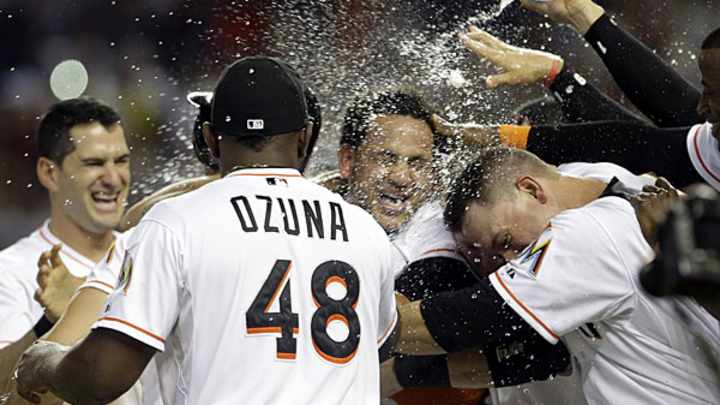Marlins selling unused tickets to Henderson Alvarez's no-hitter

The Marlins soaked Henderson Alvarez after his no-hitter became official when they won on a walk-off wild pitch in the bottom of the ninth. (Alan Diaz/AP)

Though they finished the regular season on about the most upbeat note possible via Henderson Alvarez's no-hitter on Sunday, the Marlins still lost 100 games for just the second time in their history, and finished dead last in the NL in attendance. Now they're trying to eke an additional profit out of Alvarez's big day.
On Monday, the Marlins announced that they will sell 9,100 unused tickets to Sunday's no-hitter for $15 a pop via their MLB.com site and the team store at Marlins Park. Those unsold tickets will count as attendance and thus boost the team beyond its official paid attendance figures of 28,315 for the day and 1,586,322 for the season, though they won't be enough to nudge them to 14th in the rankings or to avoid ending the season with the worst attendance drop in the second season of a new ballpark during the Bud Selig-era building boom.
This isn't the first time the Marlins have pulled this shenanigan either. They sold unused tickets to Roy Halladay's perfect game against them at Sun Life Stadium in 2010, finding takers for 3,500 such tickets in the first five hours they were on sale, many of them to Phillies fans. Since Sun Life had a capacity of 75,000 for football compared to 38,560 for baseball (of which they drew 25,086) the organization was said to be offering somewhere around 40,000 extra tickets at face value. Team president David Samson said the figures would be reported:
"As long as tickets are available, we'll keep selling," Samson said. "We'll keep going, the same way we would for a World Series or any other game. What we do is open up different sections."
Because tickets for the historic night are going to continue to be sold, the attendance figure for the game will be revised.
"It would have to be," Samson said. "Any ticket revenue is part of revenue sharing and part of the local revenue. So it gets reported."
Despite Samson's word (which ain't worth much in the first place, particularly when it comes to attendance ), it remains unknown how many such tickets the Marlins sold, since box scores at Baseball-Reference.com and other sites didn't revise their attendance figures.
To be fair, the Marlins didn't start this trend, which makes it possible for after-the-fact buyers to turn a profit on the memorabilia market even if the tickets weren't actually used — particularly if said buyers can get those mementos autographed. The White Sox appear to have been the first to try this gambit following Mark Buehrle's perfect game in 2009, and the A's — who play in a dual-purpose stadium with a level used only for football, as did the Marlins before their new park opened — did so for Dallas Braden's 2010 perfect game as well.
The Mets, who could use some spare cash as badly as the Marlins or A's, went about recognizing Johan Santana's 2012 no-hitter, the first in franchise history, in a more above-board fashion. They marketed reprinted tickets on "Season Ticket Holder stock" for $50 a pop and offered all 41,922 seats for sale, with freebies for season-ticket holders (who were still assessed a shipping-and-handling fee) and discount for partial-plan holders. Just under three weeks later, The Wall Street Journal's Brian Costa reported that "around 3,000" such tickets had sold, though it's unclear if those included the free or discounted ones.
